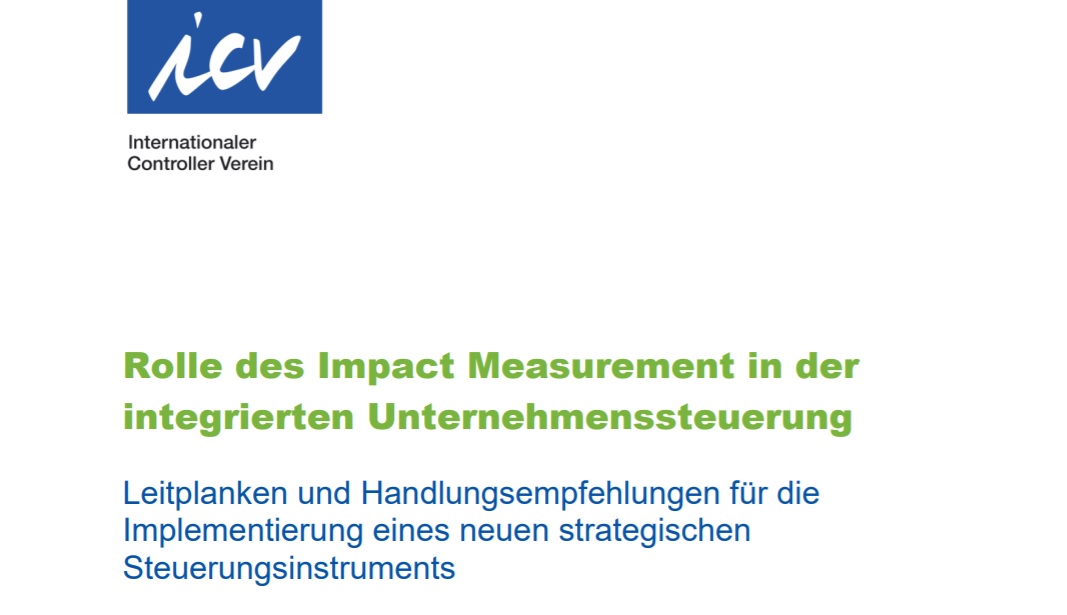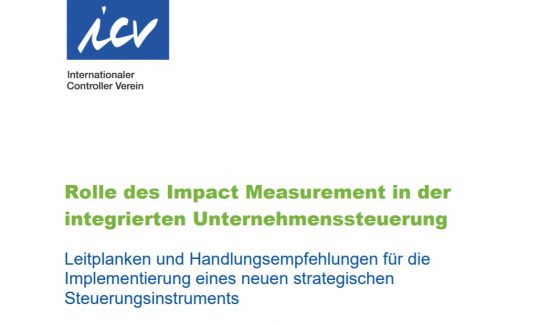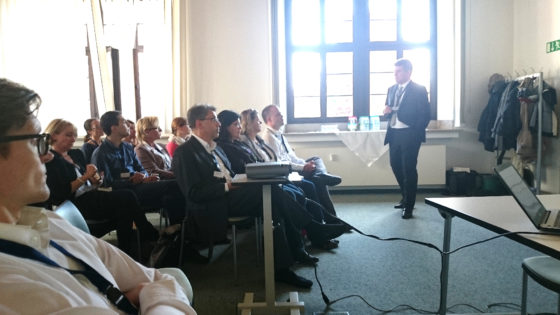Kennen Sie schon das White Paper „Rolle des Impact Measurement in der integrierten Unternehmenssteuerung – Leitplanken und Handlungsempfehlungen für die Implementierung eines neuen strategischen Steuerungsinstruments“, das der ICV-Fachkreis „Green Controlling for Responsible Business“ im September vorgelegt hat? Das 45-seitige Dokument ist auf der ICV-Website für ICV-Mitglieder kostenlos als PDF herunterladbar. Nicht-Mitglieder haben die Option, es als PDF zum Preis von 9,50 Euro über die Geschäftsstelle zu beziehen (Kontakt). Details wie Inhalts- und Quellenverzeichnis, Controllers’ Resümee sowie Autorenliste können Sie hinter diesem Link einsehen. FAK-Leiter Marco Möhrer (Zeppelin-Universität Friedrichshafen) leitet am 26. November auf der öffentlichen ICV-Tagung CCS 2020 eine der beiden Sessions zum Schwerpunkt „Sustainability“ und stellt auch dort das White Paper vor.
Die Auswirkungen wirtschaftlichen Handelns zu bewerten und zu messen rückt zunehmend in den Fokus von Unternehmen. Ein Beispiel ist der Klimawandel und seine zu erwartenden gesellschaftlichen Auswirkungen, die als Impacts bezeichnet werden. Zur umfassenden Messung der Nachhaltigkeits-Performance gehört daher auch die Erfassung der Impacts. Aufgrund der rapide steigenden Relevanz der Thematik haben sich für den ICV-Fachkreis „Green Controlling for Responsible Business“ zwei zentrale Fragen gestellt:
1) Welchen Beitrag leistet das Impact Measurement für eine integrierte Unternehmenssteuerung, d. h. die Planung und Steuerung der Nachhaltigkeitsziele?
2) Welche Relevanz hat dieses neue Steuerungsinstrument für die Arbeit der Controller?
Das White Paper ist das Ergebnis der Diskussionen im Fachkreis und bietet eine erste Einführung in das Thema Impact Measurement für die Zielgruppe der Controller. Darüber hinaus gibt es Empfehlungen und zahlreiche Tipps zu dessen Umsetzung. Als Impacts werden die durch die Unternehmensaktivitäten entstehenden Auswirkungen auf die Gesellschaft und natürliche Umwelt verstanden, wobei diese beabsichtigt oder unbeabsichtigt, positiv oder negativ, unmittelbar oder mittelbar sein können. Mit der Impact Value Chain (IVC) existiert ein Modell, das deutlich macht, dass die Betrachtung von Impacts über die bisherige Perspektive einer integrierten Unternehmenssteuerung hinausgeht. Während bislang vor allem die Inputs und Outputs der Unternehmenstätigkeit betrachtet wurden, wird die Perspektive nun auf die Outcomes und Impacts erweitert, d. h. die Folgen der Ressourcennutzung (Inputs) und Prozessergebnisse (Outputs) für die Gesellschaft und natürliche Umwelt.
Autoren des White Papers sind: Dr. Tim Dreessen (Voith GmbH & Co. KGaA.), Giulia Hardy (DATEV eG), Prof. Dr. Jana Heimel (Hochschule Heilbronn), Stefan Jordan (Deutschen Bahn AG, stellvertretender Leiter ICV-Fachkreises „Green Controlling for Responsible Business“), Claudia Maron (DATEV eG, Vorstandsmitglied ICV), Marcel Mock (Norddeutsche Landesbank), Martin Momberg (Deutsche Post DHL Group), Elisabeth Nunweiler (externe Doktorandin von Prof. Dr. Edeltraud Günther, TU Dresden), Dr. Alexander Stehle (Hauber-Gruppe, bis März 2020 ICV-Fachkreisleiter), Karl-Heinz Steinke (langjähriges ICV-Vorstandsmitglied, ehemals Konzerncontrolling Lufthansa), Silke Thomas (Deutsche Telekom), Dr. Simon Weihofen (ista International GmbH), Marco Möhrer (Zeppelin Universität Friedrichshafen, seit April 2020 Leiter ICV-Fachkreis „Green Controlling for Responsible Business“).
Are you already familiar with the white paper “The role of impact measurement in integrated corporate management – guidelines and recommendations for action for the implementation of a new strategic management tool”, which the ICV expert work group “Green Controlling for Responsible Business” presented in September? The 45-page document can be downloaded free of charge as a PDF from the ICV website for ICV members. Non-members have the option to obtain it as a PDF at the price of 9.50 Euros from the Office (contact). You can view details such as the table of contents and sources, controllers’ summary and list of authors here. Head of the Work Group Marco Möhrer (Zeppelin University Friedrichshafen) leads one of the two sessions on the focus “Sustainability” on November 26 at the ICV conference CCS 2020 and also presents the white paper there.
Evaluating and measuring the effects of economic activity is increasingly becoming the focus of companies. One example is climate change and its expected social effects, which are referred to as impacts. A comprehensive measurement of sustainability performance therefore also includes recording the impacts. Due to the rapidly increasing relevance of the topic, two central questions have arisen for the ICV expert work group “Green Controlling for Responsible Business”:
1) What contribution does impact measurement make to integrated corporate management, i.e. the planning and management of the sustainability goals?
2) What relevance does this new management instrument have for the work of the controllers?
The white paper is the result of discussions in the expert work group and offers a first introduction to the topic of impact measurement for the target group of controllers. There are also recommendations and numerous tips on how to implement it. Impacts are understood to be the effects on society and the natural environment caused by corporate activities, whereby these can be intended or unintentional, positive or negative, direct or indirect. With the Impact Value Chain (IVC) there is a model that makes it clear that the consideration of impacts goes beyond the previous perspective of an integrated corporate management. While so far the inputs and outputs of the company’s activities have been considered, the perspective is now expanded to include outcomes and impacts, i.e. the consequences of resource use (inputs) and process results (outputs) for society and the natural environment.
Authors of the white paper are: Dr. Tim Dreessen (Voith GmbH & Co. KGaA.), Giulia Hardy (DATEV eG), Prof. Dr. Jana Heimel (Hochschule Heilbronn), Stefan Jordan (Deutsche Bahn AG, Deputy Head of the ICV expert work group „Green Controlling for Responsible Business“), Claudia Maron (DATEV eG, ICV Board Member), Marcel Mock (Norddeutsche Landesbank), Martin Momberg (Deutsche Post DHL Group), Elisabeth Nunweiler (external PhD student of Prof. Dr. Edeltraud Günther, TU Dresden), Dr. Alexander Stehle (Hauber-Gruppe, until March 2020 – ICV Head of the expert work group), Karl-Heinz Steinke (long-year ICV Board Member, formerly Group Controlling Lufthansa), Silke Thomas (Deutsche Telekom), Dr. Simon Weihofen (ista International GmbH), Marco Möhrer (Zeppelin Universität Friedrichshafen, since April 2020 Head of the expert work group „Green Controlling for Responsible Business“).




